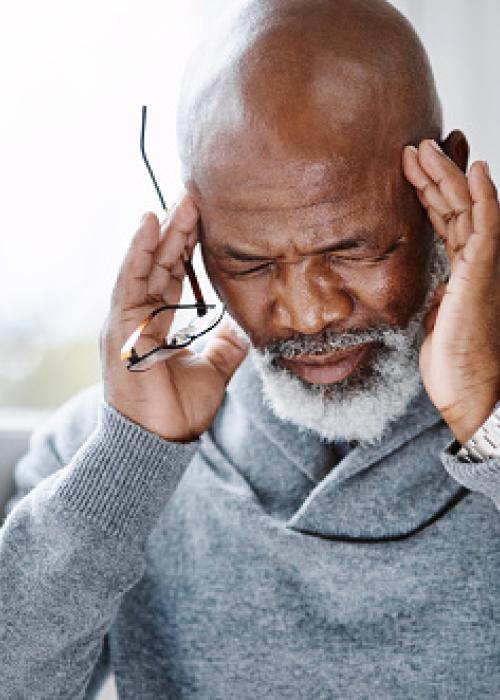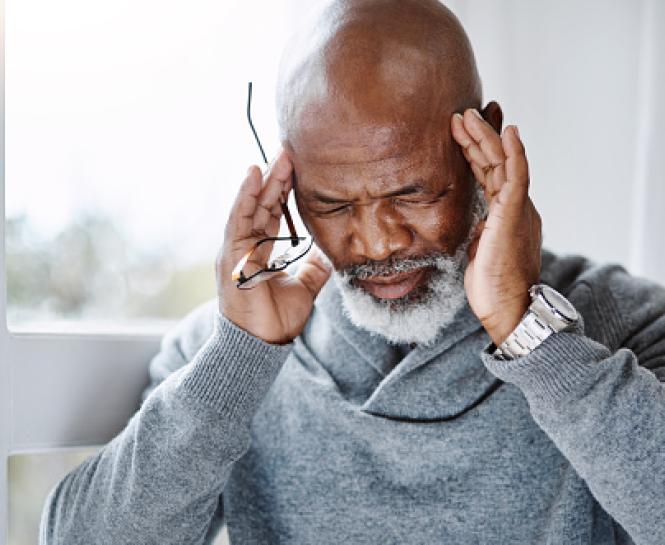Evan Chernoff, DO, Catholic Health Pain Management Physician, answers commonly asked questions about pain management.
Q. What is pain management?
Pain, unfortunately, is something we have all experienced at some point. But what happens when you have pain that is persistent and interferes with daily life? You may know the cause—like an old sports injury or low back pain—or you may not know why. Pain management is a specialty that diagnoses your type of pain and offers treatments to manage it so it does not impact your quality of life.
Pain varies in intensity and duration. The most common types of pain are acute pain and chronic pain.
Acute pain is related to an illness, accident or post-surgery. Although intense, the pain typically subsides and passes as the body heals and recovers.
Chronic pain is when pain lasts longer than six months. It can be caused by the body not healing from an illness or injury. It can also be caused by certain health conditions that affect the muscles and nerves, such as fibromyalgia and rheumatoid arthritis.
The cause of chronic pain may also be unknown. I have had many patients of all ages come to an appointment, not knowing why they have ongoing pain.
Chronic pain affects the quality of life both physically and emotionally. That is where pain management helps. A pain management physician will evaluate, diagnose and customize a treatment plan to manage or eliminate your pain so you can live a healthy, productive life.
Q. What should I expect during my first pain management visit?
At your first appointment, a pain management physician will evaluate you and ask questions that include:
- Do you know the cause of your pain?
- How would you describe the level of pain? (They may ask you to grade it on a scale of 1 to 10.)
- How often are you in pain?
- How have you treated the pain?
- Does the pain limit you physically?
- Does the pain interfere with daily activities or social interactions?
- Does the pain affect you emotionally?
Pain management uses a multidisciplinary approach, so your care team may include more than one specialist, such as a neurologist, orthopedist, and psychiatrist.
Q. What conditions does pain management treat?
Pain management treats pain in all areas of the body. Commonly treated conditions include:
- Arthritis
- Sports injuries
- Back injuries
- Orthopedic injuries
- Headaches
- Low back pain
- Nerve damage (neuropathy)
- Fibromyalgia
Q. What are the treatment options for chronic pain?
Lifestyle modifications play a key role in pain management. Maintaining a healthy weight, eating a well-balanced diet, exercising regularly, and reducing stress are crucial to regulating or eliminating pain.
Understandably, patients will tell me that is easier said than done, especially when pain is interfering and making day-to-day choices challenging. Pain can make you depressed and result in poor food choices. Pain can make you more stressed. Pain can make it hard to exercise. That is why a pain management treatment plan takes a "whole picture" approach to break the cycle of pain.
Q. What happens when lifestyle modifications are not enough? Are there other pain management treatment options?
When lifestyle changes are made but you still have ongoing pain, pain management treatment options may include:
- Physical therapy
- Non-opioid medicine
- Injections (Delivers pain relief directly to the identified pain area.)
- Stimulators (Implantable devices that use electricity to help improve pain.)
- Radiofrequency ablation (Radio waves are sent through a needle to heat the nerve area to help reduce pain.)
For some patients with severe chronic pain, especially due to structural damage to areas like the bones, muscles and nerves, surgical intervention may be recommended. Your pain management physician will recommend and work closely with a surgeon as part of your treatment and follow-up care plan.
Q. What else should I know about pain management?
I tell my patients all the time that chronic pain does not mean you have to suffer in pain for the rest of your life. You do not have to stop doing the things you love. Together, we will discuss your pain, try to find a cause for the pain, and ultimately work to find solutions for a pain-free life.
Learn more about Catholic Health's pain management services.







